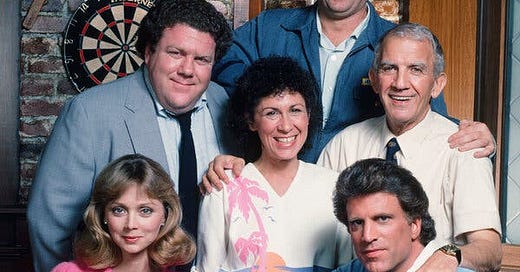The Quiet Allure of the Obituary Page
I read obituaries with a devotional intensity. Maybe something is wrong with me.
George Wendt, a.k.a. Norm From ‘Cheers,’ Is Dead at 76
A burly, easygoing Chicago native, he became a staple of living rooms across the country for more than a decade as one of America’s favorite barflies.
George Wendt, standing left, with the original cast of the long-running sitcom “Cheers.” Next to him are John Ratzenberger, center, and Nicholas Colasanto. Between Mr. Wendt and Mr. Colasanto is Rhea Perlman. In front are Shelley Long and Ted Danson.Credit...NBCUniversal, via Getty Images
May 20, 2025 Updated 5:43 p.m. ET
George Wendt, who earned six consecutive Primetime Emmy Award nominations for his role as the bearish, beer-quaffing Everyman Norm Peterson on the enduring sitcom “Cheers,” died on Tuesday morning at home in Studio City, Calif. He was 76…
"Am I the only one?"
That thought has crossed my mind more than once as I settle in with my morning coffee and the New York Times. Before I dive into the day's headlines or the editorial pages, I find myself turning, out of habit, to the obituaries. And yes, the Times does them exceptionally well – they are miniature masterclasses in biographical storytelling, capturing the essence of a life in a few carefully chosen columns. But as you might also have sensed, there's something more going on than just an appreciation for good writing.
For those who don't share this habit, it might seem morbid, a strange preoccupation with end-of-life stories. But for the rest of us, what I’ll call the quiet fellowship of obituary readers, it’s something else entirely. It's less about death and more, I have to say, about life.
What is it, then, this "something more"?
First, obituaries are concentrated doses of human experience. Each one is a compressed novel, a life lived, with its unique triumphs, struggles, unexpected turns, and quiet contributions. We encounter people who changed the world in grand, sweeping ways, and those who did so through subtle, persistent acts of kindness, innovation in a niche field, or dedication to a small community. It’s a reminder of the sheer diversity of human paths and passions. One day you might read about a pioneering scientist, the next a beloved local baker, the next an artist who only found fame posthumously. Each story adds a new thread to the vast human tapestry.
Second, they offer perspective and, often, inspiration. In a world saturated with fleeting social media updates and the relentless 24-hour news cycle, obituaries provide a longer view. They speak of dedication, perseverance, love, and legacy. Reading about someone who overcame significant adversity, or who pursued a passion relentlessly for decades, can be motivating, especially in the early morning with a long day ahead. It’s a quiet prompt to consider: what mark am I making? What truly matters in the span of a life?
There's also, third, an undeniable element of memento mori – a gentle reminder of our own mortality. But rather than being depressing, this can be strangely life-affirming. It nudges me to live more intentionally, to cherish the time I have left, and to focus on what gives my life meaning. The finality presented on the page somehow illuminates the vibrancy of the present moment.
And finally, for those who appreciate history, obituaries are living documents. They connect us to different eras, social movements, and cultural shifts. The life of someone born in the 1930s navigated a world vastly different from my own, yet their humanity – their joys, sorrows, ambitions – remains relatable. We see history not as a dry collection of dates, but rather through the lens of individual experience.
The New York Times obituaries, in particular, often feel like carefully curated glimpses into lives that shaped our culture, science, and society, sometimes in ways I never realized until I read their final chapter. They are not just lists of accomplishments but explorations of character, influence, and the times in which these individuals lived.
So, if you, like me, find yourself drawn to these chronicles of lives concluded, know that you're not alone. We're not morbid, at least I don’t think so; we're just more attuned to the profound beauty and complexity of a life fully lived. We're students of human nature, collectors of stories, and seekers of a deeper understanding of what it means to be here, for however long we're given.
What about you? Are you a fellow traveler in the land of last chapters? What draws you in? What memorable lives have you encountered there? I’d love to hear your thoughts in the comments.






I, too, read obituaries. Since I am the resident historian for The Nursing History Society at The University of Michigan, I try to keep track of graduates of our nursing programs and I then communicate those to various mailing lists. But more importantly, what I learn about people makes me wonder why did it take someone to die before I learned more fully about them. As I am now in my 8th decade of life, more and more I am reading obituaries of people I did know and I often wish we had celebrated their lives more fully. Thanks for sharing your thoughts. Linda
As well, there is a certain code used in many traditional newspaper obituaries to convey controversial information about the deceased without actually saying so, for example:
"Life of the party" = drinking problem,
"Unable to suffer fools gladly" = bully,
"Old school" = a bigot, albeit one who likes opera and looks good in a tuxedo",
"Confirmed bachelor" = gay, not out of the closet, but everyone knows,
"Ladies' man" = unable to name every woman he's ever slept with,
"Man's man" = drinks like a journalist, swears like a cop, smokes like a 1970s cab driver, drives like a country doctor, farts like a Labrador.